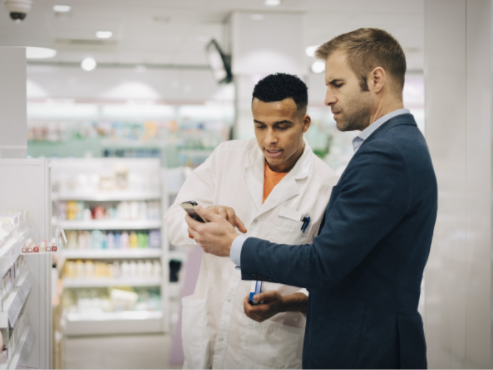Amgen is committed to developing high-quality biosimilar medicines for patients. Amgen was one of the first large-scale biotechnology manufacturers, and we have developed some of the most widely used, quality biologic medicines that have been used to treat millions of patients around the world. This page will help you understand what biosimilars are, their safety and effectiveness, and the value they provide.

A biosimilar is a biologic medicine that is highly similar to an FDA-approved biologic medicine, known as the reference biologic or reference medicine4.
The FDA undertakes comprehensive approval process to determine whether a biosimilar is approved for medical use in the United States5. This is because, like all biologics, biosimilars are developed in living cells and require a high level of scientific expertise to create. This complexity is why biosimilars are highly similar, but not identical, to their reference biologic9.

To be approved, a biosimilar must show it has no clinically meaningful differences to the reference biologic in terms of quality, safety, and its ability to produce the desired outcome in patients (also known as efficacy)5,11.
At Amgen, our biosimilar medicines are manufactured with the same high degree of quality as any of our biologic medicines8. Like all biologics, testing is performed during the manufacturing process to assess biosimilar quality.
All biosimilars must meet the robust regulatory standards of the FDA before they can be approved for use. The FDA uses research and clinical studies data (known as totality of evidence) to make sure a biosimilar works as well as its reference medicine. Once approved, all biosimilars undergo comprehensive monitoring to ensure patient safety and medicine effectiveness7.
In addition to providing the same safety and effectiveness as their reference medicine, biosimilars have the potential to lower healthcare costs by driving market competition5,6.


Amgen has been a biotechnology innovator since 1980.
We have been steeped in this challenge since the early days of recombinant DNA technology, when a handful of scientists and investors came together to prove the promise of innovative biotechnology.

We have developed 21 FDA-approved treatments and 5 approved biosimilar medicines, with 34 more medicines in various stages of clinical development.† Amgen's medicines have reached millions of people in the fight against serious illnesses.

We are leaders in the development of treatments across six therapeutic areas: oncology and hematology, cardiovascular disease, nephrology, inflammation, bone health, and neuroscience.
At Amgen, our mission has always been to develop treatment options that improve outcomes and help patients live fuller lives.
†As of July 20, 2022 AMJEVITA™ is currently not available commercially and will not be commercially available in the United States until on or after January 31, 2023.